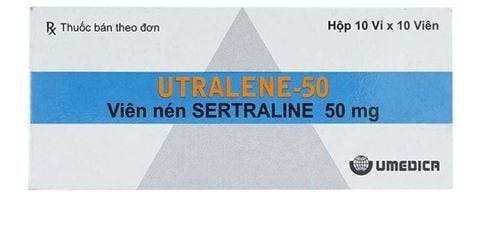This is an automatically translated article.
Pymetphage is prepared in the form of film-coated tablets with the main ingredient in each tablet is 500mg Metformin hydrochloride. So what is Pymetphage, what does it do and how is it used?1. What is Pymetphage?
The main ingredient of Pymetphage is Metformin hydrochloride, which is a biguanide drug with antidiabetic effects.Mechanism of action of Metformin hydrochloride is as follows:
Increases glucose utilization in cells. Improves insulin's binding to its receptors on cells. Inhibits glucose synthesis in the liver and at the same time reduces intestinal glucose absorption. As a result, the drug effectively reduces fasting and postprandial blood glucose levels in patients with type II diabetes.
Pymetphage is indicated in the following cases:
Non-insulin dependent diabetes mellitus (type II). Pymetphage can be used alone or in combination with sulfonylurea drugs when the use alone is not effective.
Pymetphage is contraindicated in the following cases:
People with hypersensitivity to any ingredient in the Pymetphage formula. Insulin-dependent diabetes mellitus. Metabolic acidosis, including diabetic ketoacidosis. Severe renal failure (eGFR <30 ml/min/1.73m2). Liver failure. Severe cardiovascular disease. Severe respiratory disease with hypoxia. Severe infections. Blood infection. Injury. Necrosis. Alcoholics. Malnourished people. Pregnant women. Note when using Pymetphage:
Pymetphage is not recommended during pregnancy. All pregnant women with gestational diabetes are advised to use insulin. It is not known whether Pymetphage is excreted in human milk, and consideration should be given to discontinuation or discontinuation of breast-feeding when using this drug. Due to Pymetphage drug there is a risk of hypoglycaemia affecting the ability to drive and use machines. Pymetphage should be used with caution in this case. The use of Pymetphage still needs to be combined with a reasonable diet. Pay attention to the side effects of Pymetphage, especially lactic acidosis, as in some cases it has been fatal. Use Pymetphage with caution in people with kidney failure, liver failure, heart failure and the elderly
2. Dosage and how to use Pymetphage
How to use Pymetphage is as follows:Pymetphage is taken orally, taking the tablet whole with a glass of water. The time to use Pymetphage is during breakfast. Dosage of Pymetphage drug should be according to the doctor's instructions, the reference dose is as follows:
Use the starting dose is 1 tablet / time / day. After that, the dose can be increased by 1 tablet/day, increasing the dose once a week, until the maximum dose is 4 tablets/day. Combination with Oral Sulfonylurea: For 4 weeks, the patient cannot tolerate Pymetphage at maximum dose, need to gradually add 1 oral Sulfonylurea, even though previous treatment with Sulfonylurea has failed. In 1-3 months of using the combination of drugs but still not effective, the drug should be stopped. Patients with renal impairment: The dose of Pymetphage is calculated based on the estimated glomerular filtration rate eGFR as follows: Less than 30ml/min/1.73m2: Pymetphage is contraindicated. From 30 - 45ml/min/1.73m2: It is not recommended to use Pymetphage to initiate treatment. Are using Pymetphage and have eGFR drops below 45ml/min/1.73m2: It is necessary to re-evaluate the risks - benefits when using the drug to consider whether to continue treatment or not. Patients whose eGFR falls to <30ml/min/1.73m2: The drug should be discontinued. Discontinue Pymetphage while performing an iodinated contrast imaging test. Re-evaluate the eGFR index 48 hours after the scan, re-treat with Pymetphage if renal function is stable. If you forget a dose of Pymetphage, take it as soon as you remember. Skip the missed dose if it is almost time for your next dose, take your next dose of Pymetphage as scheduled. Do not double the prescribed dose of Pymetphage.
Currently, little is known about the acute toxicity of Metformin in Pymetphage. Symptoms that may occur with an overdose of Pymetphage include hypoglycemia, lactic acidosis. If you accidentally overdose on Pymetphage and develop serious side effects, you need to immediately seek medical attention for timely treatment.
3. Pymetphage side effects
The most common side effects of Pymetphage are gastrointestinal, are usually dose related and are usually at the time of initiation and are temporary.Common side effects of Pymetphage include:
Diarrhea. Nausea, vomiting. Bloating. Undigested. Distention. Unusual stools. Constipation. Heartburn . Taste disorder. Headache. Chills. Dizzy. Muscle weakness. Shortness of breath. Upper respiratory tract infections. Skin board. Less common side effects of Pymetphage include:
Megaloblastic anemia. Pneumonia. Very rare side effects of Pymetphage include:
Lactic acidosis. If you see any unusual symptoms while using Pymetphage, you should immediately notify your doctor, or go to a medical facility for timely treatment.
4. Interaction of Pymetphage with other drugs
Do not combine Pymetphage with Cimetidine, Vancomycin, Ranitidine, Trimethoprim. Be careful when combining Pymetphage with diuretics, Isoniazid, Corticosteroids, sympathomimetic drugs, iodinated contrast agents, Phenytoin. Long-term use of Pymetphage reduces vitamin B12 absorption, but this is of little clinical importance and megaloblastic anemia is rare. Alcohol use while taking Pymetphage increases the risk of lactic acidosis.Please dial HOTLINE for more information or register for an appointment HERE. Download MyVinmec app to make appointments faster and to manage your bookings easily.













